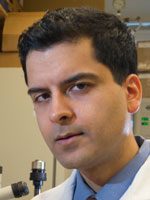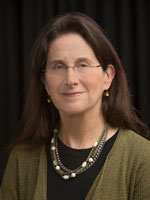It is our honor to announce this distinguished group of 2017 Scientific Achievement Award winners who are being recognized for their excellence in the pharmacology field.
The 2017 Scientific Achievement Award winners are listed below:
Divison-Sponsored Scientific Achievement Awards are listed below:
John J. Abel Award in Pharmacology
 Samie R. Jaffrey, MD, PhD
Samie R. Jaffrey, MD, PhD
Dr. Samie Jaffrey has been named the 2017 recipient of the John J. Abel Award in Pharmacology given by the American Society for Pharmacology and Experimental Therapeutics (ASPET).
The Abel Award, presented each year during the ASPET Annual Meeting, is named after the founder of ASPET. It was established in 1946 to stimulate fundamental research in pharmacology and experimental therapeutics by young investigators.
Dr. Jaffrey is being recognized for his innovative research and development of new technologies that have led to the discovery of fundamental and transformative concepts regarding how Ribonucleic Acid (RNA) is regulated to control gene expression in health and disease. Dr. Jaffrey was nominated for the Abel Award by Dr. Solomon Snyder from Johns Hopkins University School of Medicine.
Dr. Jaffrey received his MD and PhD in Neuroscience from Johns Hopkins University School of Medicine in 1999. He then became a postdoctoral fellow in the Department of Neuroscience at Johns Hopkins University School of Medicine, where he worked with Dr. Snyder. In 2001, Dr. Jaffrey joined Weill Medical College at Cornell University as assistant professor of pharmacology and currently holds the distinguished position of Greenberg-Starr Professor at Cornell University.
Dr. Jaffrey’s work has fundamentally advanced our understanding of RNA biology and gene regulation. Most recently, he has helped to launch the field of “epitranscriptomics,” which has revealed that mRNA contains diverse nucleotide modifications that impact its fate and function in cells. Dr. Jaffrey’s transcriptome-wide mapping of N6-methyladenosine (m6A) in 2012 revealed that m6A is a pervasive modification in the transcriptome, thereby identifying this modification as a fundamentally novel form post-transcriptional mRNA regulation. Since this seminal study, Dr. Jaffrey mapped dimethyladenosine (m6Am) and established functions of m6A and m6Am as well as m6A and m6Am reader, writer, and eraser proteins. As a result of his early studies, epitranscriptomics is a rapidly developing area of molecular biology that is transforming our understanding of gene regulation in normal and disease states.
ASPET will present Dr. Jaffrey with the Abel Award at the Business Meeting and Awards Presentation during the ASPET Annual Meeting at Experimental Biology 2017 in Chicago, IL on Saturday, April 22, 2017 at 5:30 p.m. The presentation will be held at the McCormick Place Convention Center West Building in Room 470ab.
Dr. Jaffrey will deliver the John J. Abel Award in Pharmacology Lecture on Sunday, April 23, 2017 from 8:30 a.m. – 9:20 a.m. in Room 470b.
Return to top
Julius Axelrod Award in Pharmacology
 Michel Bouvier, PhD
Michel Bouvier, PhD
Dr. Bouvier has been named the 2017 recipient of the Julius Axelrod Award in Pharmacology given by the American Society for Pharmacology and Experimental Therapeutics (ASPET).
The Axelrod Award was established in 1991 to honor the memory of the eminent American pharmacologist who shaped the fields of neuroscience, drug metabolism, and biochemistry and who served as a mentor for numerous eminent pharmacologists around the world. Awarded every year during the ASPET Annual Meeting, the Axelrod Award is presented for significant contributions to understanding the biochemical mechanisms underlying the pharmacological actions of drugs and for contributions to mentoring other pharmacologists.
Dr. Bouvier is being recognized for both his important contributions to the field of G-protein-coupled receptors (GPCRs) and for the profound impact he has had as a mentor to his former students and postdocs. Having been mentored himself by a former postdoc of Julius Axelrod, Dr. Bouvier trained his associates in that same spirit.
Dr. Bouvier was nominated for the Axelrod Award by Dr. Marc Caron from Duke University Medical Center.
Dr. Bouvier earned his PhD in Neurological Sciences from Université de Montreal Faculty of Medicine in 1984. Afterwards, he was a postdoctoral trainee at Duke University Medical Center. Dr. Bouvier then moved back to Université de Montreal Faculty of Medicine, where he became Assistant Professor in the Department of Biochemisty. He is currently Chief Executive Officer of the Institute for Research in Immunology and Cancer (IRIC) and Deputy Vice-Rector for Research, Discovery, Creation and Innovation at Université de Montreal.
Dr. Bouvier and his laboratory have greatly impacted the field of GPCRs with inventive concepts of inverse agonism and biased signaling. His laboratory’s finding that pharmacologically selective small molecules can promote folding and restore trafficking and function to otherwise defective GPCR led to the identification of pharmacological chaperones as potential treatment for genetic diseases, including a successful pilot clinical trial for treatment of nephrogenic diabetes insipidus. Dr. Bouvier and his laboratory also pioneered the development of bioluminescence resonance energy transfer (BRET) approaches, leading to the development of more than 40 biosensors monitoring protein-protein interactions, post-translational modifications, and second messenger production.
ASPET will present Dr. Bouvier with the Axelrod Award during the Business Meeting and Awards Presentation at the ASPET Annual Meeting at Experimental Biology 2017 in Chicago, IL on Saturday, April 22, 2017 at 5:30 p.m. The presentation will be held at the McCormick Place Convention Center West Building in Room 470ab.
Return to top
Otto Krayer Award in Pharmacology
 Joan Heller Brown, PhD
Joan Heller Brown, PhD
Dr. Joan Heller Brown has been named the 2017 recipient of the Otto Krayer Award in Pharmacology given by the American Society for Pharmacology and Experimental Therapeutics (ASPET).
The Otto Krayer Award commemorates the enduring legacy of Dr. Otto Krayer's ethical behavior, commitment to teaching, high standards of scientific scholarship, publication and editorship, promotion of interdisciplinary research to reveal the actions of drugs or other chemicals, and his guidance and support of younger scientists.
With this award, Dr. Heller Brown is being recognized for her interdisciplinary and pathfinding studies on G-protein-coupled receptors (GPCRs), scientific scholarship, and strong commitment to the teaching and mentoring of younger scientists. Dr. Heller Brown was nominated for the award by Drs. Palmer Taylor and Paul Insel from the University of California, San Diego (UC San Diego).
Dr. Heller Brown received her PhD in Pharmacology from Albert Einstein College of Medicine (AECOM). She was an NIH predoctoral trainee with the Department of Pharmacology at AECOM, where her first publication, demonstrating that the dopamine receptor couples to adenylate cyclase and is the target of antipsychotic drugs, was communicated to the PNAS by her department chair, Dr. Alfred Gilman Senior. Dr. Heller Brown was then an NIH postdoctoral fellow in the Department of Pharmacology at the University of Colorado Medical Center in Denver. After her postdoctoral fellowship in 1975, Dr. Heller Brown moved to UC San Diego where she has held many important positions. Since 2002, Dr. Heller Brown has served as chair of UC San Diego’s Department of Pharmacology and is currently Distinguished Professor of Pharmacology.
Dr. Heller Brown’s work has led to the discoveries that muscarinic GPCRs inhibit adenylate cyclase, GPCRs that stimulate phospholipase C and CaM kinase II regulate cardiac hypertrophy and heart failure, and GPCRs that activate RhoA contribute to neuroinflammation and aberrant cancer cell proliferation. Her research has been consistently funded by NIH and reported in 230 peer reviewed papers. She has served on multiple editorial boards, including five currently, and was editor of the ASPET journal Molecular Pharmacology. Dr. Heller Brown received the ASPET Benedict R. Lucchesi Distinguished Lectureship in Cardiac Pharmacology in 2009 and has served as keynote speaker at past ASPET Annual Meetings.
ASPET will present Dr. Heller Brown with the Otto Krayer Award during the Business Meeting and Awards Presentation at the ASPET Annual Meeting at Experimental Biology 2017 in Chicago, IL on Saturday, April 22, 2017 at 5:30 p.m. The presentation will be held at the McCormick Place Convention Center West Building in Room 470ab.
Dr. Heller Brown will deliver the Otto Krayer Award in Pharmacology Lecture on Monday, April 24, 2017 from 2:00 p.m. – 2:50 p.m. in Room 470b.
Return to top
David Lehr Research Award
 Paul A. Insel, MD
Paul A. Insel, MD
Dr. Paul Insel has been named the 2017 recipient of the David Lehr Research Award given by the American Society for Pharmacology and Experimental Therapeutics (ASPET). The David Lehr Research Award was established with generous funding from Mrs. Lisa Lehr to extend funding for preclinical or clinical research directed towards improving human health.
Dr. Insel is being recognized for his continued efforts to discover and validate novel G-protein coupled receptors (GPCRs) as drug targets for diseases in need of new, effective therapies; in this case, for pancreatic cancer.
Dr. Insel received his MD from the University of Michigan and subsequent clinical training in the Harvard Medical Service at Boston City Hospital. He then undertook research training at NIH (NICHD Gerontology Research Center and NCI Laboratory of Theoretical Biology) and at the University of California, San Francisco (UC San Francisco) where he joined the UC San Francisco faculty in the Department of Medicine. Later, Dr. Insel moved to the University of California, San Diego (UC San Diego) where he has held many significant positions. Since 1989, Dr. Insel has been the director of the UC San Diego MD/PhD Training Program and is currently Distinguished Professor of Pharmacology and Medicine.
Dr. Insel’s major research efforts have focused on studies of GPCRs with respect to their expression, signaling mechanisms, regulation and roles in health and disease through the use of biochemical, cell biological and molecular biological approaches. He has also studied heterotrimeric G-proteins, G-protein-regulated effectors, compartmentation of signaling molecules in lipid raft/caveolin domains, mechanisms of cAMP-promoted apoptosis, and the use of “omics”/systems biology approaches to define GPCR expression and the cAMP-regulated transcriptome and proteome.
Dr. Insel is a member of the Advisory Panel on Research of the American Association of Medical Colleges. He has also served as an editor or senior editor of numerous scientific journals, including ASPET’s Molecular Pharmacology. He is currently the editor of the Annual Review of Pharmacology and Toxicology and co-head of Faculty of the Faculty of 1000 Prime in Pharmacology and Drug Discovery.
ASPET will present Dr. Insel with the David Lehr Research Award during the Business Meeting and Awards Presentation at the ASPET Annual Meeting at Experimental Biology 2017 in Chicago, IL on Saturday, April 22, 2017 at 5:30 p.m. The presentation will be held at the McCormick Place Convention Center West Building in Room 470ab.
Return to top
Pharmacia-ASPET Award in Experimental Therapeutics
 Craig W. Lindsley, PhD
Craig W. Lindsley, PhD
Dr. Craig Lindsley has been named the 2017 recipient of the Pharmacia-ASPET Award in Experimental Therapeutics given by the American Society for Pharmacology and Experimental Therapeutics (ASPET).
The Pharmacia-ASPET Award recognizes and stimulates outstanding research in pharmacology and experimental therapeutics, basic laboratory or clinical research that has had, or potentially will have, a major impact on the pharmacological treatment of disease.
Dr. Lindsley is being recognized for his pioneering use of technology-enabled synthesis, which led to fundamental and transforming effects on medicinal chemistry, pharmacology, and drug discovery. Dr. Lindsley was nominated for the award by Dr. P. Jeffrey Conn from Vanderbilt University.
Dr. Lindsley earned his PhD in Chemistry from the University of California, Santa Barbara. He then did his postdoctoral fellowship at Harvard University. In June 2001, Dr. Lindsley went to Merck & Co. where he developed a streamlined approach for lead optimization. This resulted in the accelerated delivery of seven drug candidates for oncology, schizophrenia and cognition, in which three drugs entered human testing.
In September 2006, Dr. Lindsley moved to Vanderbilt University, where he has served in multiple leadership roles, including director of the Vanderbilt Specialized Chemistry Center for Accelerated Probe Development. He is currently William K. Warren, Jr. Chair in Medicine, Professor of Pharmacology (with tenure), and director of Medicinal Chemistry for the Vanderbilt Center for Neuroscience Drug Discovery (VCNDD). Since 2008, Dr. Lindsley has licensed 8 programs to major pharmaceutical companies and several molecules developed within the VCNDD are in late-stage IND-enabling studies aimed at addressing major unmet CNS disorders through allosteric modulation.
Dr. Lindsley serves on the Executive Committee of ASPET’s Division for Molecular Pharmacology. He has received numerous awards over his career, including the John J. Abel Award in 2014 and the ASPET- Astellas Award for Translational Pharmacology in 2010. Dr. Lindsley is the founding Editor-in-Chief of ACS Chemical Neuroscience and currently serves on multiple editorial boards.
ASPET will present Dr. Lindsley with the Pharmacia-ASPET Award during the Business Meeting and Awards Presentation at the ASPET Annual Meeting at Experimental Biology 2017 in Chicago, IL on Saturday, April 22, 2017 at 5:30 p.m. The presentation will be held at the McCormick Place Convention Center West Building in Room 470ab.
Return to top
Robert R. Ruffolo Career Achievement Award in Pharmacology
 Donald P. McDonnell, PhD
Donald P. McDonnell, PhD
Dr. Donald McDonnell has been named the 2017 recipient of the Robert R. Ruffolo Career Achievement Award in Pharmacology.
The Ruffolo Award was established in 2011 in recognition of the contributions made to drug discovery and development by Dr. Ruffolo. The award honors the scientific achievements of scientists who are at the height of their careers and who have made significant contributions to any area of pharmacology.
Dr. McDonnell is being recognized for his genetic and pharmacological dissection of steroid receptor signal transduction pathways and the development of novel estrogen and androgen receptor modulators with therapeutic applications. He was nominated for the award by Dr. David Mangelsdorf, the Alfred G. Gilman Distinguished Chair in Pharmacology at the University of Texas Southwestern Medical Center.
Dr. McDonnell earned his BS in Biochemistry from National University of Ireland Galway and his PhD in Cell Biology from Baylor College of Medicine in Houston. During his PhD studies, he cloned the cDNA for the vitamin D receptor and demonstrated its relation to the classical steroid receptors. Dr. McDonnell subsequently spent a year as a postdoctoral fellow at Smith, Kline & Beckman, Inc., where he developed a further interest in studying the molecular pharmacology of nuclear receptors.
In 1990, Dr. McDonnell became Assistant Professor of Cell Biology at Baylor College of Medicine. The following year, he returned to drug discovery as Director and Head of Molecular Biology at Ligand Pharmaceuticals, Inc. In 1994, Dr. McDonnell moved to Duke University, where his work has since focused on the genetic and pharmacological dissection of steroid receptor signal transduction pathways and the development of novel estrogen and androgen receptor modulators, some of which are clinical candidates being evaluated as treatments for a variety of endocrinopathies.
Dr. McDonnell is currently the Glaxo-Wellcome Professor of Molecular Cancer Biology and chairman of the Department of Pharmacology and Cancer Biology at Duke University School of Medicine. He serves as co-director of the Women’s Cancer Program, Duke Cancer Institute.
Dr. McDonnell has received numerous investigator awards, including the Pharmacia-ASPET Award for Experimental Therapeutics in 2005 and ASPET’s John J. Abel Award in Pharmacology in 1999. He is an Honorary Fellow of the Royal College of Physicians, Ireland. Dr. McDonnell has published over 250 articles on the molecular pharmacology of nuclear hormone receptors. He was recently elected to the National Academy of Medicine.
The Ruffolo Award will be presented during the Business Meeting and Awards Presentation at the ASPET Annual Meeting at Experimental Biology 2017 in Chicago, IL on Saturday, April 22, 2017 at 5:30 p.m. The presentation will be held at the McCormick Place Convention Center West Building in Room 470ab.
Return to top
Reynold Spector Award in Clinical Pharmacology
 Margaret R. MacLean, MBE, PhD, FRSE, FBPhS, FRSB
Margaret R. MacLean, MBE, PhD, FRSE, FBPhS, FRSB
Dr. Margaret MacLean has been named the 2017 recipient of the Reynold Spector Award in Clinical Pharmacology.
The Spector Award was established in 2014 in recognition of Dr. Spector’s dedication and contributions to clinical pharmacology. The award recognizes excellence in research and/or teaching in the field.
Dr. MacLean is being recognized for her excellence in research on pulmonary arterial hypertension and her dedication to postgraduate teaching. She was nominated for the award by Dr. Rhian Touyz from the University of Glasgow.
Dr. MacLean earned both her BS in Biological Sciences and her PhD in Pharmacology from Edinburgh University. After receiving her PhD, Dr. MacLean became a postdoctoral associate at the University of Florida and then Cambridge University. In 1989, she moved to Glasgow University, where she has held many significant positions. Dr. MacLean was dean of graduate studies in the College of Medical, Veterinary and Life Sciences, and is currently a professor of pulmonary pharmacology.
Dr. MacLean’s research has focused on the pharmacology of PDE5, ET-1 and serotonin in the pulmonary circulation and how this changes during the development of pulmonary arterial hypertension (PAH). As PAH is more prevalent in females, her current work concentrates on sex effects and oestrogen metabolism in PAH. This work has contributed to PDE5 inhibitors and ET-1 antagonists being used to treat PAH. More recently, her work has encouraged clinical trials of aromatase inhibitors and tryptophan hydroxylase inhibitors for PAH.
Dr. MacLean has always had a passion for postgraduate student training, having attracted over £4M for PhD and MRes opportunities.
Over her career, Dr. MacLean has been the recipient of numerous prestigious awards. She received an MBE in the 2010 Queen’s New Year’s Honours list for her career and public engagement. In 2013, she was elected as a Fellow of the Royal Society of Edinburgh (FRSE) and now sits on Council of the RSE.
ASPET will present Dr. MacLean with the Spector Award during the Business Meeting and Awards Presentation at the ASPET Annual Meeting at Experimental Biology 2017 in Chicago, IL on Saturday, April 22, 2017 at 5:30 p.m. The presentation will be held at the McCormick Place Convention Center West Building in Room 470ab.
Dr. MacLean will deliver the Reynold Spector Award in Clinical Pharmacology Lecture on Sunday, April 23, 2017 from 2:00 p.m. – 2:50 p.m. in Room 470b.
Return to top
Division for Drug Metabolism - Early Career Achievement Award
Hyunyoung (Young) Jeong, PharmD, PhD
Dr. Hyunyoung Jeong has been named the 2017 recipient of the ASPET Division for Drug Metabolism Early Career Achievement Award.
This award was established to recognize excellent original research by early career investigators in the area of drug metabolism and disposition. With this award, we recognize Dr. Jeong for her pioneering work to elaborate the mechanisms of regulation of drug metabolism enzymes, and to understand the molecular basis of interindividual variability in drug metabolism.
Hyunyoung (Young) Jeong is an Associate Professor in the Departments of Pharmacy Practice and Biopharmaceutical Sciences at the College of Pharmacy, University of Illinois at Chicago (UIC). Dr. Jeong received her PharmD and PhD in pharmacokinetics from UIC, followed by postdoctoral training in molecular pharmacology at UIC. Since joining the faculty at UIC in 2006, she has established a very strong research program in drug metabolism and pharmacokinetics (DMPK), funded by multiple agencies including NIH [R21 (2008-2011), K12 (Building Interdisciplinary Research Careers in Women’s Health; 2008-2011), and two R01s (2011-2017, 2015-2019)].
Her research has significantly advanced multiple areas in DMPK. Most importantly, she has studied the effects of complex physiological changes accompanying pregnancy on P450 expression and elucidated underlying mechanisms using innovative models including CYP-humanized mice. Her studies revealed previously unknown, important roles of pregnancy-related hormones in the regulation of hepatic drug-metabolizing enzymes.
Additionally, her research team has identified potential mechanisms underlying the induction of CYP2D6-mediated drug metabolism during pregnancy, the clinical finding that has intrigued the DMPK community as CYP2D6 was considered to be a non-inducible gene. Her study provided novel insights into the regulation of CYP2D6 expression, as well as into the interindividual variability in CYP2D6-mediated drug metabolism. Additionally, she identified a molecular basis for the association between novel genetic polymorphisms in CYP2C9 and warfarin dose, and has participated in multiple NIH-funded drug discovery and development projects providing expertise in DMPK.
The division will present this award at the ASPET Annual Meeting at Experimental Biology 2017 in Chicago, IL and Dr. Jeong will give a short lecture on Monday, April 24, 2017 during the Division for Drug Metabolism session from 3:00 p.m. - 5:30 p.m. in Room 474a of McCormick Place Convention Center, West Building.
Return to top
Division for Neuropharmacology - Early Career Independent Investigator Award
Carrie R. Ferrario, PhD
Dr. Carrie Ferrario has been named the 2017 recipient of the ASPET Division for Neuropharmacology Early Career Independent Investigator Award.
Dr. Ferrario is an assistant professor in the department of pharmacology at the University of Michigan Medical School.
Dr. Ferrario has developed expertise in a number of areas ranging from molecular pharmacology to nutrition and behavior. She has used her impressive arsenal of skills to investigate brain mechanisms mediating reinforcement, including excessive food consumption and drug taking. Her group has discovered rather astonishing long-term changes in brain function and behavior caused by eating “junk food”. The implications of her research in rats are significant for human health insofar as they underscore the overlapping neurobiology of food addiction and drug addiction and provide clear evidence that eating certain types of food might profoundly impact vulnerability to abuse drugs. Thus, her work is highly relevant to the current obesity epidemic and to the ongoing challenges of drug and alcohol abuse.
In addition to her research, Dr. Ferrario teaches a number of courses and has received mentoring awards at her university for her work with undergraduates, graduate students, and postdocs.
The award will be presented during the ASPET Annual Meeting at Experimental Biology 2017 in Chicago, IL at the Division for Neuropharmacology’s Annual Business Meeting on Tuesday, April 25, 2017 from 5:30 p.m. – 6:30 p.m. in Room 470a of the McCormick Place Convention Center in Chicago.
Return to top
Division for Toxicology - Career Award
Curtis D. Klaassen, PhD
Dr. Curtis Klaassen has been named the 2017 recipient of the ASPET Division for Toxicology Career Award.
Dr. Klaassen is an affiliate professor in the department of environmental and occupational health sciences in the School of Public Health at the University of Washington in Seattle. He was previously the chair of the department of Pharmacology and a University Distinguished Professor at the University of Kansas Medical Center.
While Dr. Klaassen has left a significant mark in the field of heavy metal toxicity, his most significant accomplishments have been in the field of ADME and the effect of so called microsomal enzyme inducers to alter the disposition of xenobiotics. He began more than 45 years ago to demonstrate that certain environmental chemicals which cause altered pharmacokinetic properties can have significant health consequences. Drugs such as the cardiac glycosides and acetaminophen were excellent examples of potentially toxic agents in certain individuals depending on their age or exposure to other xenobiotics. These observations that were made in the ‘60s and ‘70s were later expanded by mechanistic studies made possible by the incorporation of newer technologies in the ‘90s and 2000s. The discovery and sequencing of drug transporters allowed him to connect pharmacokinetic observations to their molecular mechanisms which included activation of nuclear receptors for gene transcription and competing substrate specificities of sinusoidal and canalicular efflux transporters.
In addition to his personal commitment to science, Dr. Klaassen has been a constant advocate for the discipline of toxicology and the training of toxicologists.
The award will be presented during the ASPET Annual Meeting at Experimental Biology 2017 in Chicago, IL at the Division for Toxicology session on Tuesday, April 25, 2017 (time and location TBD).
Return to top
Division for Toxicology - Junior Investigator Award
Elaine M. Leslie, PhD
Dr. Elaine Leslie has been named the 2017 recipient of the ASPET Division for Toxicology Junior Investigator Award.
Dr. Leslie is an associate professor in the department of physiology at the University of Alberta. She received her PhD from Queen’s University in Ontario, Canada.
The current focus of her laboratory is to understand how MRPs and GSTs are involved in the detoxification of the human carcinogen arsenic. Understanding how arsenic is detoxified is extremely important because millions of people world-wide are exposed to unacceptable levels of arsenic in drinking water. Her laboratory uses recombinant human proteins and primary human cell models to identify and characterize arsenic biotransformation and transport pathways. The long-term goal of this research is to understand how genetic variation in human MRPs and GSTs influence the inter-individual susceptibility to arsenic-induced carcinogenesis. She believes that ultimately these results will lead to the development of strategies to prevent and treat arsenic-induced carcinogenicity and toxicity.
Dr. Leslie has made important research contributions in four areas: 1) the role of transport proteins in tissue defense; 2) arsenic transport by human MRP1 and MRP2; 3) establishment of the physiological and toxicological relevance of the sandwich cultured hepatocyte (SCH) model; and 4) hepatobiliary disposition of arsenic.
The award will be presented during the ASPET Annual Meeting at Experimental Biology 2017 in Chicago, IL (time and location TBD).
Return to top